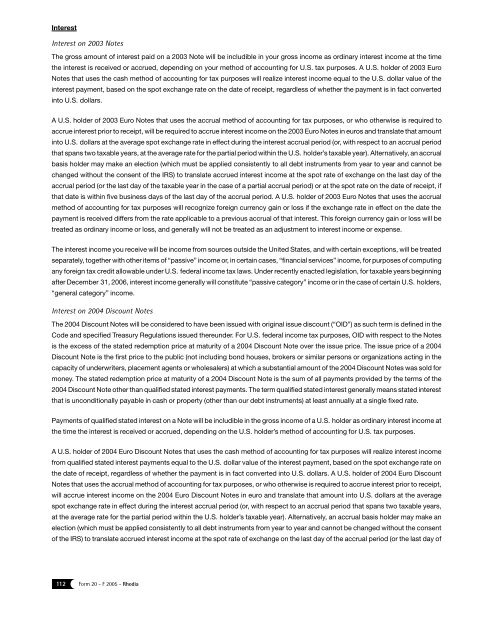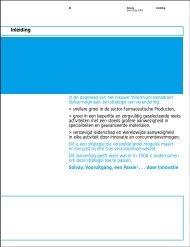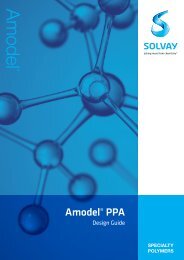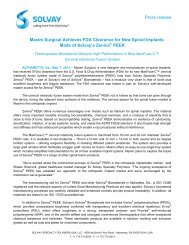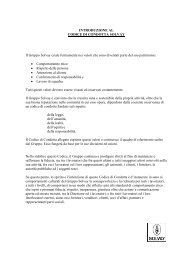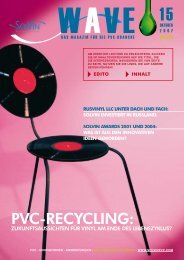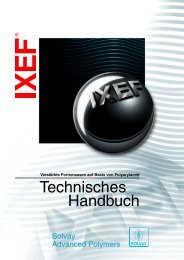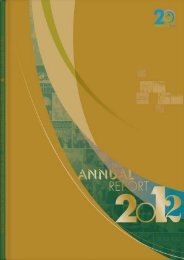Form 20-F 2005
Form 20-F 2005
Form 20-F 2005
You also want an ePaper? Increase the reach of your titles
YUMPU automatically turns print PDFs into web optimized ePapers that Google loves.
Interest<br />
Interest on <strong>20</strong>03 Notes<br />
The gross amount of interest paid on a <strong>20</strong>03 Note will be includible in your gross income as ordinary interest income at the time<br />
the interest is received or accrued, depending on your method of accounting for U.S. tax purposes. A U.S. holder of <strong>20</strong>03 Euro<br />
Notes that uses the cash method of accounting for tax purposes will realize interest income equal to the U.S. dollar value of the<br />
interest payment, based on the spot exchange rate on the date of receipt, regardless of whether the payment is in fact converted<br />
into U.S. dollars.<br />
A U.S. holder of <strong>20</strong>03 Euro Notes that uses the accrual method of accounting for tax purposes, or who otherwise is required to<br />
accrue interest prior to receipt, will be required to accrue interest income on the <strong>20</strong>03 Euro Notes in euros and translate that amount<br />
into U.S. dollars at the average spot exchange rate in effect during the interest accrual period (or, with respect to an accrual period<br />
that spans two taxable years, at the average rate for the partial period within the U.S. holder’s taxable year). Alternatively, an accrual<br />
basis holder may make an election (which must be applied consistently to all debt instruments from year to year and cannot be<br />
changed without the consent of the IRS) to translate accrued interest income at the spot rate of exchange on the last day of the<br />
accrual period (or the last day of the taxable year in the case of a partial accrual period) or at the spot rate on the date of receipt, if<br />
that date is within five business days of the last day of the accrual period. A U.S. holder of <strong>20</strong>03 Euro Notes that uses the accrual<br />
method of accounting for tax purposes will recognize foreign currency gain or loss if the exchange rate in effect on the date the<br />
payment is received differs from the rate applicable to a previous accrual of that interest. This foreign currency gain or loss will be<br />
treated as ordinary income or loss, and generally will not be treated as an adjustment to interest income or expense.<br />
The interest income you receive will be income from sources outside the United States, and with certain exceptions, will be treated<br />
separately, together with other items of “passive” income or, in certain cases, “financial services” income, for purposes of computing<br />
any foreign tax credit allowable under U.S. federal income tax laws. Under recently enacted legislation, for taxable years beginning<br />
after December 31, <strong>20</strong>06, interest income generally will constitute “passive category” income or in the case of certain U.S. holders,<br />
“general category” income.<br />
Interest on <strong>20</strong>04 Discount Notes<br />
The <strong>20</strong>04 Discount Notes will be considered to have been issued with original issue discount (“OID”) as such term is defined in the<br />
Code and specified Treasury Regulations issued thereunder. For U.S. federal income tax purposes, OID with respect to the Notes<br />
is the excess of the stated redemption price at maturity of a <strong>20</strong>04 Discount Note over the issue price. The issue price of a <strong>20</strong>04<br />
Discount Note is the first price to the public (not including bond houses, brokers or similar persons or organizations acting in the<br />
capacity of underwriters, placement agents or wholesalers) at which a substantial amount of the <strong>20</strong>04 Discount Notes was sold for<br />
money. The stated redemption price at maturity of a <strong>20</strong>04 Discount Note is the sum of all payments provided by the terms of the<br />
<strong>20</strong>04 Discount Note other than qualified stated interest payments. The term qualified stated interest generally means stated interest<br />
that is unconditionally payable in cash or property (other than our debt instruments) at least annually at a single fixed rate.<br />
Payments of qualified stated interest on a Note will be includible in the gross income of a U.S. holder as ordinary interest income at<br />
the time the interest is received or accrued, depending on the U.S. holder’s method of accounting for U.S. tax purposes.<br />
A U.S. holder of <strong>20</strong>04 Euro Discount Notes that uses the cash method of accounting for tax purposes will realize interest income<br />
from qualified stated interest payments equal to the U.S. dollar value of the interest payment, based on the spot exchange rate on<br />
the date of receipt, regardless of whether the payment is in fact converted into U.S. dollars. A U.S. holder of <strong>20</strong>04 Euro Discount<br />
Notes that uses the accrual method of accounting for tax purposes, or who otherwise is required to accrue interest prior to receipt,<br />
will accrue interest income on the <strong>20</strong>04 Euro Discount Notes in euro and translate that amount into U.S. dollars at the average<br />
spot exchange rate in effect during the interest accrual period (or, with respect to an accrual period that spans two taxable years,<br />
at the average rate for the partial period within the U.S. holder’s taxable year). Alternatively, an accrual basis holder may make an<br />
election (which must be applied consistently to all debt instruments from year to year and cannot be changed without the consent<br />
of the IRS) to translate accrued interest income at the spot rate of exchange on the last day of the accrual period (or the last day of<br />
112 <strong>Form</strong> <strong>20</strong> - F <strong>20</strong>05 - Rhodia


